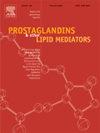Rosmarinic acid alleviates the cardiac abnormalities in high fat diet induced hypercholesterolemic rats
IF 2.5
3区 生物学
Q3 BIOCHEMISTRY & MOLECULAR BIOLOGY
Prostaglandins & other lipid mediators
Pub Date : 2024-11-28
DOI:10.1016/j.prostaglandins.2024.106936
引用次数: 0
Abstract
Hyperlipidemia is a well-known risk factor for atherosclerosis and subsequent atherosclerotic cardiovascular diseases that are associated with high morbidity and mortality in obese and diabetic patients worldwide. The current study looked on rosmarinic acid's cadioprotective effects in rats fed a high-fat diet as there was no study on this aspect. The rats were given a high-fat diet comprising of 84.3 % conventional laboratory rat chow, 5 % lard, 10 % egg yolk powder, 0.2 % cholesterol, and 0.5 % bile salt to produce hypercholesterolemia. Over a span of eight weeks. The plasma lipid profile, cardiac marker enzymes, membrane bound ATPases, lysosomal enzymes, CRP, fibrinogen, proinflammatory cytokines (IL-1β, IL-6,TNF-α, NF-κB),anti-inflammatory cytokine(IL-10) lipid peroxidation markers, enzymatic and non-enzymatic antioxidant enzymes activity were examined. The thoracic aorta's histopathology was also analyzed. It was discovered that the rats fed a high-fat diet had hypercholesterolemia and showed aberrant values in the aforementioned parameters. However, rats given rosmarinic acid (100 mg/kg b.w.) had these anomalies reversed to near-normal levels. The biochemical investigation was corroborated by enhanced histological examination of the thoracic aorta in rats suffering from hypercholestolemia. The effects of rosmarinic acid on a number of measures were similar to those of the prescription medication simvastatin. These findings revealed that rosmarinic acid is an important component in the cardiovascular system's defence against a high-fat diet induced hypercholesterolemia
迷迭香酸可减轻高脂饮食致高胆固醇血症大鼠心脏异常
高脂血症是动脉粥样硬化和随后的动脉粥样硬化性心血管疾病的一个众所周知的危险因素,与世界范围内肥胖和糖尿病患者的高发病率和死亡率有关。目前的研究着眼于迷迭香酸对高脂肪饮食大鼠的心脏保护作用,因为没有这方面的研究。给大鼠喂食高脂肪饮食,其中包括84.3 %常规实验室大鼠饲料,5 %猪油,10 %蛋黄粉,0.2 %胆固醇和0.5 %胆汁盐,以产生高胆固醇血症。在八周的时间里。检测血脂谱、心脏标志物酶、膜结合atp酶、溶酶体酶、CRP、纤维蛋白原、促炎细胞因子(IL-1β、IL-6、TNF-α、NF-κB)、抗炎细胞因子(IL-10)脂质过氧化标志物、酶和非酶抗氧化酶活性。同时对胸主动脉组织病理学进行分析。研究发现,喂食高脂肪食物的大鼠出现高胆固醇血症,上述参数值出现异常。然而,给大鼠迷迭香酸(100 mg/kg b.w.)后,这些异常恢复到接近正常水平。高胆固醇血症大鼠的胸主动脉强化组织学检查证实了生化调查。迷迭香酸对多项指标的影响与处方药物辛伐他汀相似。这些发现表明迷迭香酸是心血管系统防御高脂肪饮食引起的高胆固醇血症的重要成分
本文章由计算机程序翻译,如有差异,请以英文原文为准。
求助全文
约1分钟内获得全文
求助全文
来源期刊

Prostaglandins & other lipid mediators
生物-生化与分子生物学
CiteScore
5.80
自引率
3.40%
发文量
49
审稿时长
2 months
期刊介绍:
Prostaglandins & Other Lipid Mediators is the original and foremost journal dealing with prostaglandins and related lipid mediator substances. It includes basic and clinical studies related to the pharmacology, physiology, pathology and biochemistry of lipid mediators.
Prostaglandins & Other Lipid Mediators invites reports of original research, mini-reviews, reviews, and methods articles in the basic and clinical aspects of all areas of lipid mediator research: cell biology, developmental biology, genetics, molecular biology, chemistry, biochemistry, physiology, pharmacology, endocrinology, biology, the medical sciences, and epidemiology.
Prostaglandins & Other Lipid Mediators also accepts proposals for special issue topics. The Editors will make every effort to advise authors of the decision on the submitted manuscript within 3-4 weeks of receipt.
 求助内容:
求助内容: 应助结果提醒方式:
应助结果提醒方式:


